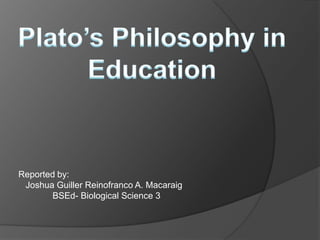
Plato’s philosophy in education
- 1. Reported by: Joshua Guiller Reinofranco A. Macaraig BSEd- Biological Science 3
- 3. Plato’s Philosophy A. Every individual should devote his life to what is best fitted for him to do. B. The important function of education is to determine what every individual is by nature capable and fitted of doing things. C. Poor leadership will lead to wrong decision. D. Social justice is giving what is due to whom it is due.
- 4. Plato’s Philosophy E. The physical objects are not permanent representations of unchanging ideas alone give true knowledge as they are known by mind. F. Intellectual aristocracy is the rule of intellectual elite. G. An individual who should be endowed with superior intelligence and possessed impeccable integrity.
- 5. INTRODUCTION Plato was born in Athens in 427 B.C in a wealthy and influential family. Plato began his philosophical career as a student of Socrates. When the master died, Plato travelled to Egypt and Italy, studied with students of Pythagoras, and spent several years advising the ruling family of Syracuse. Eventually, he returned to Athens and established his own school of philosophy at the Academy. About 387 BC, Plato founded a school in Athens, in a grove sacred to the demigod Academus, called the Academy (which is where we get the word academics from today).
- 6. THE WORKS RELATED TO EDUCATION Republic is a dialogue which discusses the education necessary to produce such a society. It is an education of a strange sort – he called it paideia. Nearly impossible to translate into modern idiom, paideia refers to the process whereby the physical, mental and spiritual development of the individual is of paramount importance. It is the education of the total individual. He discusses early education mainly in the Republic, written about 385 B.C.E., and in the Laws, his last work, on which he was still at work at the end of his life.
- 7. PLATO’S EPISTEMOLOGY He distinguished between the reality presented to us by our senses sight, touch, taste, sound and smell and the essence or Form of that reality. In other words, reality is always changing – knowledge of reality is individual, it is particular, it is knowledge only to the individual knower, it is not universal.
- 8. There are 3 sources of knowledge: Knowledge obtained from senses i.e. knowledge of objects , colours, taste, touch etc. But Plato does not consider this as real knowledge. An opinion regarding any object , but this knowledge cannot be relied upon as the views of every person differs regarding the same object. Knowledge through mind or wisdom – it is the highest degree of knowledge which includes virtues like truth , goodness and beauty. This knowledge is idealistic and is based on original thinking. The characteristic of knowledge is that it is found in the form of universal truth.
- 9. The highest goal of education, Plato believed, is the knowledge of Good; to nurture a man to a better human being, it is not merely an awareness of particular benefits and pleasures.
- 10. EDUCATION SYSTEM Children enter school at six where they first learn the three Rs (reading, writing and counting) and then engage with music and sports.
- 11. TEACHING METHODS Plato recommended play method at elementary level; student should learn by doing. And when he/she reaches the higher level of education, his reason would be trained in the processes of thinking and abstracting. Plato wanted motivation and interest in learning. He was against the use of force in education. "Knowledge which is acquired under compulsion obtains no hold on the mind." According to Plato "Do not then train youths by force and harshness, but direct them to it by what amuses their minds so that you may be better able to discover with accuracy the peculiar bent of the genius of each."
- 12. TEACHING METHODS Plato wanted a place where children love to go and stay there and they play with things which enhance their education by playing. Plato gave importance to nursery education, as nursery education plays a vital role in the education of man and it helps to build his moral character and state of mind "The most important part of education is proper training in the nursery."
- 13. ROLE OF THE TEACHER In Plato’s plan of education The educator is considered to have greatest importance. He is like torch bearer who leads a man lying in the dark cave, out of the darkness into the bright light of the outside world. The teacher is thus the constant guide of the students. The teacher must be a person of high integrity and must possess high self worth. He must have pleasing personality, in depth knowledge and professional training. He should be deeply committed to his profession, have high sense of responsibility and a true role model. Teachers should lead a true moral life. They should practice what they preach.
- 14. In a nutshell, Plato’s polis (state) is essentially an educational community. It is created by education. It can survive only on condition that all its citizens receive an education that enables them to make rational political decisions. It is up to education to preserve the state intact and to defend it against all harmful innovations. The aim of education is not personal growth but service of the state, which is the guarantor of the happiness of its citizens for as long as they allow it to be the embodiment of justice. Education must be compulsory for all.
